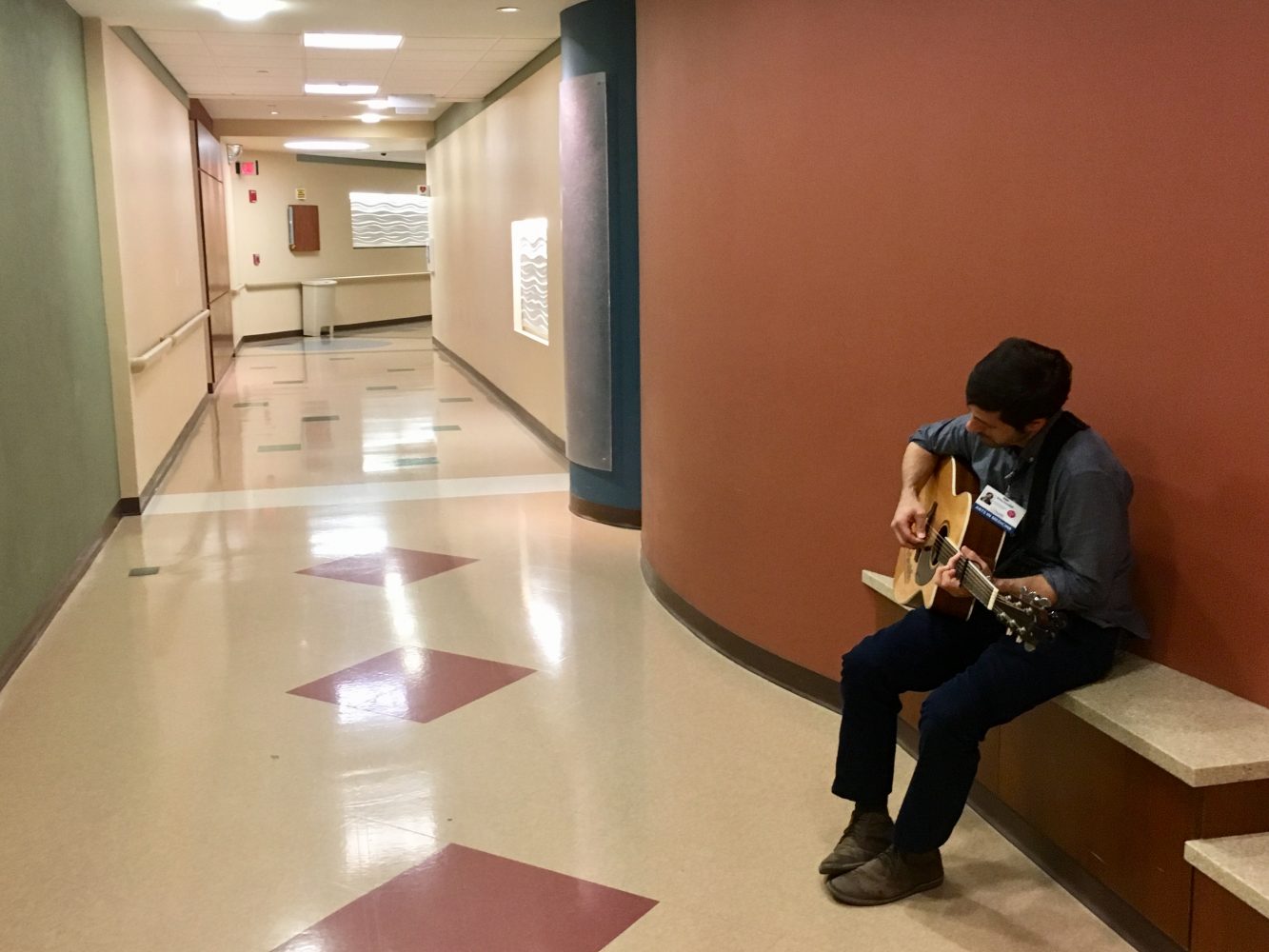By Natalie Rao and Meredith Sheldon | April 26, 2018
UF Health Arts in Medicine Resident Ricky Kendall Brings Medicinal Music to the Bedside
Perched comfortably on a gray hospital chair, Ricky Kendall picks up his guitar to play.
The instrument is a classic wood color with a blue and orange UF Health logo across the bottom. He strums it gently and opens his mouth to sing.
First, Henry Mancini and Johnny Mercer’s “Moon River.” Next, Crosby, Stills and Nash’s “Our House.”
Laying in her hospital bed, Peggy Pilon watches peacefully while he performs. His voice rings out, filling the room and drowning out the sounds of beeping hospital machines and nurses walking by. For a few moments, a hospital room at UF Health Shands Cancer Hospital is a place of art and collaboration for patients more familiar with hardship.
Kendall is one of 14 artists in residence at UF Health. Through music, visual arts and other types of artwork, each of these artists help patients cope with an avenue aside from medicine alone.
For Kendall, who joined the program in 2012, this involves musical performances every Monday through Thursday. His daily routine consists of both one-on-one visits in the form of patient referrals and making rounds similar to a nurse or doctor, as well as more general work such as performing in the tunnels that connect each hospital. He keeps things entirely focused on the patient, from what they want to hear to how long they want him to play, or if they want anything at all.
“They usually enjoy it,” Kendall said. “I feel like they usually get at least a distraction from their pain. At the most, they’ll really enjoy it and end up with a smile on their face and completely forget about where they are.”
Pilon is one of many patients Kendall has visited throughout his years at UF Health. A triple cancer survivor who was at Shands for a kidney stone on Friday, April 13, Pilon had never met Kendall before but enjoyed his performance nevertheless.
“I think all music helps you heal,” Pilon said. “Having been a person who isn’t like other people [who are] really fond of music because I tend to concentrate, I find it, when I have music, I’m listening to the music and not concentrating on what I’m supposed to be doing, which means that I really do like music.”

After volunteering with a former artist in residence for about a year, Kendall accepted a full-time position at the hospital in 2012. As the years passed, Kendall and a few others became inspired to somehow share their work with the world outside the hospital.
The answer to this inspiration came in 2014 with Tiny Bed Sessions.
This idea, which draws affectionately from NPR’s “Tiny Desk Concerts,” came from Kendall, as well as Tina Mullen, the director of the Arts in Medicine program, and Dave Melosh, one of the partners of the local concert venue and live recording studio Heartwood Soundstage. Melosh, who was doing promotional work for UF Health, offered to bring professional recording equipment in to give people an intimate glimpse into Arts in Medicine.
“We tried to figure out ways to really describe what the work looks like,” Mullen, said. “And it’s difficult to do, right? Artists at the bedside in the hospital is hard to conceptualize – the depth at which they go in those interactions… It’s special and it’s unexpected, which is really the nature of all the work we do.”
Mullen has been a part of Arts in Medicine since its inception in 1990.
“It’s special and it’s unexpected, which is really the nature of all the work we do.”
Tiny Bed Sessions began with one patient who Kendall said, “was going through a really rough experience,” while being treated at UF Health. In addition to an open, talkative personality, Kendall said this patient always carried a sock full of harmonicas.
“We thought it would be so cool to capture this guy’s interaction with what we do because he’s super talkative,” Kendall said. “He’s super into sharing his experience with why the songs mean something to him that he requests, and he also loves to play the harmonica.”
This culminated in the first of the Tiny Bed Sessions. Kendall and fellow artist in residence Michael Claytor came together to play “Worried Man Blues” for this patient. Clad in yellow hospital gowns and with guitars in hand, the two performed while the patient played harmonica along with them.
“It was collaborative. It was beautiful. He told us on camera what he thought of what we did and what we did for him. It was a really nice way to show the public what this is and ultimately just garner attention for the beautiful things that are happening here and support for it,” Kendall said.
The Tiny Bed Sessions continued throughout 2014 and 2015. There were times that musicians simply performed for patients, such as Michael Claytor and Jason Hedges’ cover of “You’ll Be In My Heart” for a patient named Lia waiting on a heart transplant.
There were also times that patients joined the collaboration by performing themselves, such as when Kendall covered “Golden Train” with patient Jamal Davis taking the lead on vocals.
And if there’s one thing consistent throughout each of the Tiny Bed Sessions, it’s that each ends with a smile and even a laugh.
The Tiny Bed Sessions aren’t the only project Kendall has participated in throughout his time at UF Health. Although he’s worked with patients of every age, from those coming into the world to those leaving it, he was inspired by the children he worked with.
After years of wanting to create an album for children, Kendall collaborated with pediatric patients at UF Health to create “Thankful For Love,” an album by children, for children. Although the songs are certainly lighter, they tell a more compelling story than most kids’ albums today.
“A lot of times it’s these kids’ lives and stories and imaginations, and their thoughts about dreams, about being brave, about your stuffed animals, about having a baby brother or baby sister come into the world and what that feels like… So it’s like having the real people that you’re trying to write about give you all the information, then you can kind of do with that a bunch of different creative things,” Kendall said.
The inspiration for the album came from a young patient named Brianna. While waiting for a heart transplant, she talked to Kendall about things she was thankful for, which led to the album’s title and the title track, “Thankful For Love.”
“These kids provided a lot of imagination,” Kendall said. “They provided a lot of comedy but also a lot of depth and emotion.”
Although “Thankful For Love” came out at the end of 2017, Kendall has more planned with the hospital. He said that Tiny Bed Sessions is on hiatus for the moment, but will no doubt return sometime in the future. One of the goals for the project is to scale down the equipment to make for a more intimate experience.
As for what working at UF Health has given him, he’s learned a lot about what it means to be human.
“Before I started working here, I could write about a theoretical person in a hard place, like in a difficult spot,” he said. “And I could imagine all these different things they might feel and think, and even the beautiful things they might feel or think in the middle of something, or go by my own experience… But to see someone in a cancer hospital who is smiling and singing along to the music, and you know exactly what they’re going through and they talk to you about it — It’s inspirational in a way that not many other things could be.”
This impact doesn’t go unnoticed. Mullen too is continuously inspired by the artists she works with daily.
“When a performer, musician, goes onstage, they go on in an outward way,” Mullen said. “’I’m a performer.’ When you go into a patient room, you don’t. You go in an inward way. You’re connecting with the patient. And Ricky, and Michael, and Sam and Jason, Max, everybody on our team has the ability to remove that sense of performance and go in and give their music as a gift.”
 Special Report from WUFT News
Special Report from WUFT News